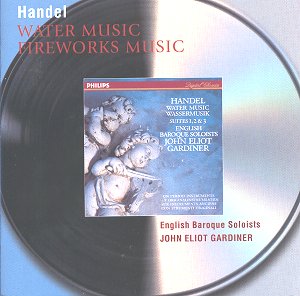Georg Friedrich HAENDEL
(1685-1759)
Water Music *
Variant in F major [4.02]
Suite no. 1 in F major [25.51]
Variant in F major [3.27]
Suite no. 3 in G major [10.11]
Suite no. 2 in D major [9.44]
Music for the Royal Fireworks ** [15.59]
Rec: * 1983; ** 1991.
 English Baroque Soloists John
Eliot Gardiner English Baroque Soloists John
Eliot Gardiner
 PHILIPS 464 706-2
[69.21] PHILIPS 464 706-2
[69.21]
Crotchet
AmazonUK
AmazonUS
Amazon
recommendations |
 |
These two orchestral works by Haendel are his two most popular, and most
recorded, instrumental works. Water Music was composed for a celebration
on the Thames in 1717. While the overall work is clearly 'outdoor' music
(with a strong presence of lush string arrangements, horns and trumpets),
one of its three suites (the G major suite) is closer to chamber music, with
its cohort of flutes and recorders.
This is noble, regal music, composed for one purpose: celebration. It is
permeated with positive energy; even the slow movements show this. Composed
in three suites, Water Music was played originally by '50
instruments of all sorts' on a barge floating down the Thames. Gardiner's
recording includes two F major variants, and changes the order of the three
suites, but the notes give no explanations concerning this. This
historically-inspired performance, on original instruments, gives the listener
the feeling of authenticity - this is far from the lush, over-arranged romantic
versions that have been recorded endlessly in recent decades. The magnificent
textures heard in this recording give the music everything it deserves.
The Music for the Royal Fireworks was written in 1749 for the
celebrations of the peace at Aix-la-Chapelle. Martial music, opening with
a fanfare of horns and resounding timpani, this is an anthem to the glory
of the King. While the original performance featured a large orchestra, with
no fewer than 24 oboes, 12 bassoons, and an overwhelming amount of percussion
instruments, Gardiner chooses here to record it with a much smaller group,
'as might have played at Haendel's repeat performances in concert form.'
The result is delightful. As with Water Music, the texture of this recording
allows the listener fully to appreciate the details of the orchestration
and arrangement. In the martial sections, such as the Overture, the horns
ring out clear and sharp. In the slower sections, such as the beautifully
pastoral movement entitled La Paix (Peace), or the Menuets, the orchestra
shows a great deal of subtlety and emotion.
Definitely one of the best recordings of these two works, Gardiner's performances
are precise, just and perfectly balanced. He manages to combine both the
regal and noble elements of these works with the playful spirit that lies
behind much of Haendel's music. The scale of his ensemble is just right for
each work - neither too imposing no too limited. The sound, as with other
recordings in this series, is impeccable.
Kirk McElhearn

